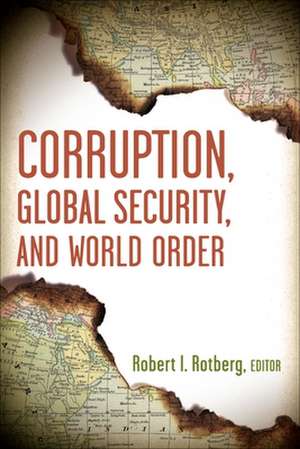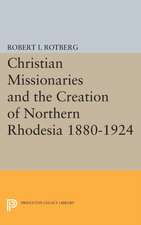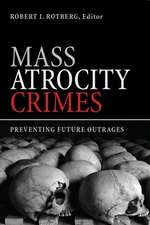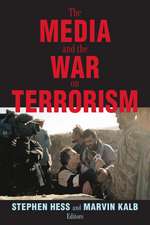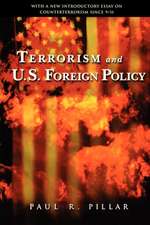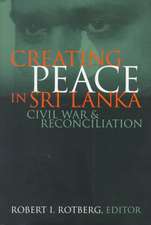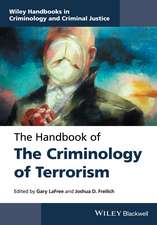Corruption, Global Security, and World Order
Editat de Robert I. Rotbergen Limba Engleză Paperback – 24 aug 2009
Never before have world order and global security been threatened by so many destabilizing factors—from the collapse of macroeconomic stability to nuclear proliferation, terrorism, and tyranny. Corruption, Global Security, and World Order reveals corruption to be at the very center of these threats and proposes remedies such as positive leadership, enhanced transparency, tougher punishments, and enforceable sanctions. Although eliminating corruption is difficult, this book's careful prescriptions can reduce and contain threats to global security.
Contributors: Matthew Bunn (Harvard University), Erica Chenoweth (Wesleyan University), Sarah Dix (Government of Papua New Guinea), Peter Eigen (Freie Universität, Berlin, and Africa Progress Panel), Kelly M. Greenhill (Tufts University), Charles Griffin (World Bank and Brookings), Ben W. Heineman Jr. (Harvard University), Nathaniel Heller (Global Integrity), Jomo Kwame Sundaram (United Nations), Lucy Koechlin (University of Basel, Switzerland), Johann Graf Lambsdorff (University of Passau, Germany, and Transparency International), Robert Legvold (Columbia University), Emmanuel Pok (National Research Institute, Papua New Guinea), Susan Rose-Ackerma n (Yale University), Magdalena Sepúlveda Carmona (United Nations), Daniel Jordan Smith (Brown University), Rotimi T. Suberu (Bennington College), Jessica C. Teets (Middlebury College), and Laura Underkuffler (Cornell University).
Contributors: Matthew Bunn (Harvard University), Erica Chenoweth (Wesleyan University), Sarah Dix (Government of Papua New Guinea), Peter Eigen (Freie Universität, Berlin, and Africa Progress Panel), Kelly M. Greenhill (Tufts University), Charles Griffin (World Bank and Brookings), Ben W. Heineman Jr. (Harvard University), Nathaniel Heller (Global Integrity), Jomo Kwame Sundaram (United Nations), Lucy Koechlin (University of Basel, Switzerland), Johann Graf Lambsdorff (University of Passau, Germany, and Transparency International), Robert Legvold (Columbia University), Emmanuel Pok (National Research Institute, Papua New Guinea), Susan Rose-Ackerma n (Yale University), Magdalena Sepúlveda Carmona (United Nations), Daniel Jordan Smith (Brown University), Rotimi T. Suberu (Bennington College), Jessica C. Teets (Middlebury College), and Laura Underkuffler (Cornell University).
Preț: 388.29 lei
Nou
Puncte Express: 582
Preț estimativ în valută:
74.30€ • 77.77$ • 61.84£
74.30€ • 77.77$ • 61.84£
Carte tipărită la comandă
Livrare economică 31 martie-14 aprilie
Preluare comenzi: 021 569.72.76
Specificații
ISBN-13: 9780815703297
ISBN-10: 0815703295
Pagini: 497
Dimensiuni: 152 x 229 x 30 mm
Greutate: 0.68 kg
Editura: Brookings Institution Press
Colecția Brookings Institution Press
ISBN-10: 0815703295
Pagini: 497
Dimensiuni: 152 x 229 x 30 mm
Greutate: 0.68 kg
Editura: Brookings Institution Press
Colecția Brookings Institution Press
Notă biografică
Robert I. Rotberg is director of the Program on Intrastate Conflict and Conflict Resolution at Harvard University's Kennedy School of Government and president of the World Peace Foundation. He has written or edited numerous books, including China into Africa: Trade, Aid, and Influence (2008).
Descriere
Never before have world order and global security been threatened by so many destabilizing factors—from the collapse of macroeconomic stability to nuclear proliferation, terrorism, and tyranny. Corruption, Global Security, and World Order reveals corruption to be at the very center of these threats and proposes remedies such as positive leadership, enhanced transparency, tougher punishments, and enforceable sanctions. Although eliminating corruption is difficult, this book's careful prescriptions can reduce and contain threats to global security.
Contributors: Matthew Bunn (Harvard University), Erica Chenoweth (Wesleyan University), Sarah Dix (Government of Papua New Guinea), Peter Eigen (Freie Universität, Berlin, and Africa Progress Panel), Kelly M. Greenhill (Tufts University), Charles Griffin (World Bank and Brookings), Ben W. Heineman Jr. (Harvard University), Nathaniel Heller (Global Integrity), Jomo Kwame Sundaram (United Nations), Lucy Koechlin (University of Basel, Switzerland), Johann Graf Lambsdorff (University of Passau, Germany, and Transparency International), Robert Legvold (Columbia University), Emmanuel Pok (National Research Institute, Papua New Guinea), Susan Rose-Ackerma n (Yale University), Magdalena Sepúlveda Carmona (United Nations), Daniel Jordan Smith (Brown University), Rotimi T. Suberu (Bennington College), Jessica C. Teets (Middlebury College), and Laura Underkuffler (Cornell University).
Contributors: Matthew Bunn (Harvard University), Erica Chenoweth (Wesleyan University), Sarah Dix (Government of Papua New Guinea), Peter Eigen (Freie Universität, Berlin, and Africa Progress Panel), Kelly M. Greenhill (Tufts University), Charles Griffin (World Bank and Brookings), Ben W. Heineman Jr. (Harvard University), Nathaniel Heller (Global Integrity), Jomo Kwame Sundaram (United Nations), Lucy Koechlin (University of Basel, Switzerland), Johann Graf Lambsdorff (University of Passau, Germany, and Transparency International), Robert Legvold (Columbia University), Emmanuel Pok (National Research Institute, Papua New Guinea), Susan Rose-Ackerma n (Yale University), Magdalena Sepúlveda Carmona (United Nations), Daniel Jordan Smith (Brown University), Rotimi T. Suberu (Bennington College), Jessica C. Teets (Middlebury College), and Laura Underkuffler (Cornell University).
